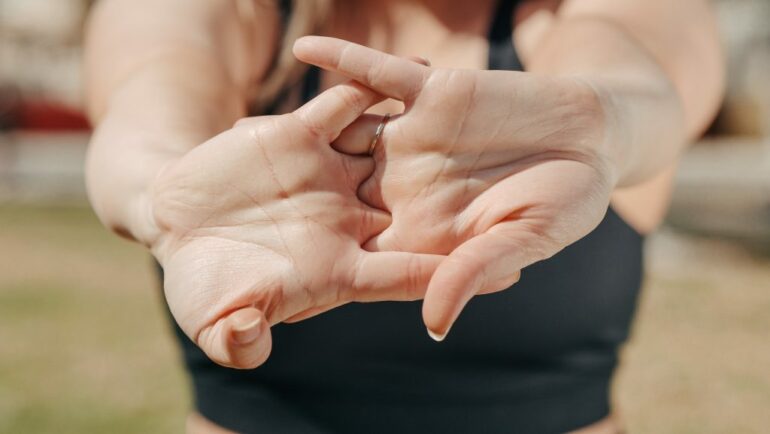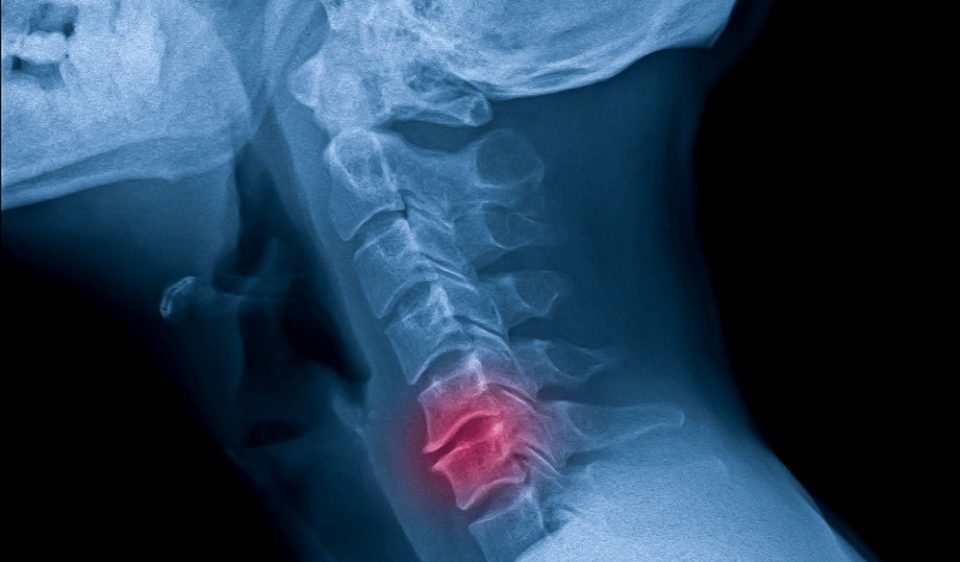I’m not kidding when I say I can crack almost every joint in my body. I crack my fingers, elbows, back, shoulder, knees, ankles, neck, and toes–not always in that exact order. Every single time I do so in my mom’s presence, she never fails to remind me that it’s not good for my joints. Along with a wide-eyed stare, I receive a comment of either “You’ll get arthritis!” or “Your joints will get damaged!” I’ve actually heard the arthritis comment from many people, which should get me to stop, but old habits die hard. However, the comments did get me wondering: does popping or cracking a joint actually harm it? Let’s take a look.
The Joint
First, we need to understand the joints in our body. A joint is the space where two bones meet, and it exists between all bones–with exception to the hyoid bone, the bone in your neck that aids with speaking and swallowing, but that’s a story for another day. In a joint, several different parts of the body work together to protect the bones from rubbing and wearing each other out. One such part is cartilage–the tissue that makes up your outer ear–which acts like a cushion between the bones. But the most important part that protects the joint from inflammation would be the synovial fluid, which helps with nutrition and lubrication within the joint. This ultra-filtered version of blood is produced and regulated by the synovium, a tissue lining the joint capsule. Synovial fluid helps transfer nutrition such as water and macromolecules to the cartilage, keeping it healthy. It also serves as lubrication and
:max_bytes(150000):strip_icc():format(webp)/synovial_joint-5b6efd4c46e0fb00253e4c5e.jpg) cushioning with its special non-newtonian properties, meaning that the thickness of the fluid is dependent on other factors. The viscosity of the synovial fluid decreases as speed increases (like when we move the bones), providing lubrication. This means that when the joint is being used, the synovial fluid gets thicker. However, the elasticity of the fluid also increases as speed increases, allowing for better protection at the same time. Here, elasticity refers to the fluid’s ability to resist direct pressure. Ultimately, as the joint is being used, the synovial fluid provides better protection by resisting the pressure exerted on the joint. This fascinating fluid also contains molecular nitrogen (N2) that is normally dissolved as a part of the synovial fluid. This nitrogen is important if you want to be a master joint cracker like me.
cushioning with its special non-newtonian properties, meaning that the thickness of the fluid is dependent on other factors. The viscosity of the synovial fluid decreases as speed increases (like when we move the bones), providing lubrication. This means that when the joint is being used, the synovial fluid gets thicker. However, the elasticity of the fluid also increases as speed increases, allowing for better protection at the same time. Here, elasticity refers to the fluid’s ability to resist direct pressure. Ultimately, as the joint is being used, the synovial fluid provides better protection by resisting the pressure exerted on the joint. This fascinating fluid also contains molecular nitrogen (N2) that is normally dissolved as a part of the synovial fluid. This nitrogen is important if you want to be a master joint cracker like me.
What happens when you crack a joint?
When you twist, pull, and bend your joints to crack them, the space between the joints are pulled apart. This decreases the pressure of the synovial fluid within the joints, partially collapsing the microscopic nitrogen bubbles within the synovial fluid…and CRACK! There’s the sound of your knuckles cracking (and the sound of your parents’ nagging). You may have noticed that once a joint has been cracked, you can’t crack it again for a while, though if you’re like me, you try anyway. During this time, the synovial fluid works to recreate and expand the popped air bubbles. And once these air bubbles are big enough, in about 20 minutes, your joints are ready to be cracked again.
Does cracking your joints cause arthritis?
A study by Dr. Robert Swezey and Dr. Stuart Swezey at the University of Southern California School of Medicine observed the long-term effects of knuckle cracking by studying individuals that could recall whether or not they habitually cracked their knuckles since they were young. They then compared the joint health of those who replied that they were habitual knuckle crackers to those who replied that they were not. The study did not find a correlation between knuckle cracking and joint degeneration. A separate study was done by Dr. Donald Unger on the effects of cracking knuckles. Apparently I wasn’t the only one who was tired of receiving comments about cracking joints–Dr. Unger cracked only the knuckles on his left hand for sixty years to prove his mother wrong. This experiment won him the Ig Nobel award, a parody of the Nobel prize meant for unusual and humorous scientists. These letters discuss the results of Dr. Donald Unger’s experiment, in which he found no significant difference in health between his left and right hand. Dr. Unger’s experiment was only done on himself though, so keep in mind the small sample size. To add to these studies, Johns Hopkins’ Arthritis Center also states there is no apparent evidence that cracking joints–the part where the joint makes a sound–in and of itself causes arthritis or other harm to the joint.
Now, all of this evidence makes it really tempting to think that cracking different joints, especially your knuckles, isn’t all that bad for you. This makes sense because joint cracking is simply air bubbles popping, as we’ve discussed earlier. After all, we have a published study, a medical doctor, and a famous hospital center all saying that the act doesn’t cause arthritis. So we can all go off into the sunset popping our joints as often as we can. Right?
Wrong (unfortunately). Though cracking your joints is not associated with arthritis, it has other harmful effects. While it’s true that the cause of the popping sound is harmless, if you’ve ever cracked your back or fingers, you know that producing that pop can take a fair amount of twisting and pulling. During this process of bothering your joint, you can injure your ligaments (the connective tissue that literally attaches bones together). An injury–stretch or tear–to the ligament is commonly referred to as a sprain. For those who already have weakened ligaments, this injury can happen more easily. In addition, a study by two doctors also shows a correlation between habitual knuckle cracking and hand grip strength, indicating that cracking your knuckles too often can have a negative impact on hand function.
In case all of that wasn’t enough risk, cracking joints other than your hand knuckles carries its own risk. For example, the spine carries the spinal cord and all its nerves within it. When you crack your back, you can accidentally pinch nerves, strain muscles, sprain ligaments, or injure blood vessels. All of these cause immense pain, especially for a person with a very low pain tolerance (me). I would imagine that for similar reasons of possible nerve injury, cracking the neck would also pose great risk.
The Consensus
Now, I’ve been cracking my joints since elementary school, and nothing hurts yet. Knock on wood! This often leads me to rolling my eyes at my mom when she nags me about my habits. Though the belief that cracking joints causes arthritis may be false, there are still risks to habitually cracking your knuckles. Which leads me to very begrudgingly admit that maybe I should reduce how much I crack my joints.
Sources:
https://www.urmc.rochester.edu/encyclopedia/content.aspx?contenttypeid=85&contentid=P00044
https://www.britannica.com/science/joint-skeleton/The-synovial-fluid
https://time.com/5220275/knuckles-crack-science-why-reason/
https://www.ncbi.nlm.nih.gov/pmc/articles/PMC1129752/
https://www.latimes.com/archives/la-xpm-2009-oct-02-sci-ignobels2-story.html
https://doi.org/10.1002/1529-0131(199805)41:5<949::AID-ART36>3.0.CO;2-3
https://www.hopkinsarthritis.org/arthritis-news/knuckle-cracking-q-a-from/
https://www.ncbi.nlm.nih.gov/pmc/articles/PMC1004074/
https://www.orthobullets.com/basic-science/9018/synovium-and-synovial-fluid
https://www.healthline.com/health/back-cracking#risks
Image Sources:
https://www.thoughtco.com/types-of-joints-in-the-body-4173736
https://kasachiro.com/news/chiropractic/is-it-bad-to-crack-your-neck-2/
https://www.vox.com/2015/3/9/8161779/knuckle-cracking-science



